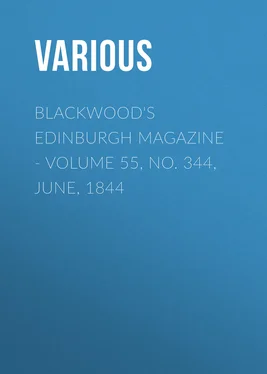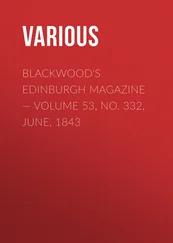Various - Blackwood's Edinburgh Magazine. Volume 55, No. 344, June, 1844
Здесь есть возможность читать онлайн «Various - Blackwood's Edinburgh Magazine. Volume 55, No. 344, June, 1844» — ознакомительный отрывок электронной книги совершенно бесплатно, а после прочтения отрывка купить полную версию. В некоторых случаях можно слушать аудио, скачать через торрент в формате fb2 и присутствует краткое содержание. Издательство: Иностранный паблик, Жанр: foreign_antique, periodic, foreign_edu, на английском языке. Описание произведения, (предисловие) а так же отзывы посетителей доступны на портале библиотеки ЛибКат.
- Название:Blackwood's Edinburgh Magazine. Volume 55, No. 344, June, 1844
- Автор:
- Издательство:Иностранный паблик
- Жанр:
- Год:неизвестен
- ISBN:нет данных
- Рейтинг книги:4 / 5. Голосов: 1
-
Избранное:Добавить в избранное
- Отзывы:
-
Ваша оценка:
- 80
- 1
- 2
- 3
- 4
- 5
Blackwood's Edinburgh Magazine. Volume 55, No. 344, June, 1844: краткое содержание, описание и аннотация
Предлагаем к чтению аннотацию, описание, краткое содержание или предисловие (зависит от того, что написал сам автор книги «Blackwood's Edinburgh Magazine. Volume 55, No. 344, June, 1844»). Если вы не нашли необходимую информацию о книге — напишите в комментариях, мы постараемся отыскать её.
Blackwood's Edinburgh Magazine. Volume 55, No. 344, June, 1844 — читать онлайн ознакомительный отрывок
Ниже представлен текст книги, разбитый по страницам. Система сохранения места последней прочитанной страницы, позволяет с удобством читать онлайн бесплатно книгу «Blackwood's Edinburgh Magazine. Volume 55, No. 344, June, 1844», без необходимости каждый раз заново искать на чём Вы остановились. Поставьте закладку, и сможете в любой момент перейти на страницу, на которой закончили чтение.
Интервал:
Закладка:
Sir Walter Scott , 5 5 Essay on The Fairies of Popular Superstition , in “The Minstrelsy of the Scottish Border.”
writing—the first in time of all men who have written—at large and scientifically upon the fairies of Western Europe, steps into disquisition by a description, duly loose for leaving his own foot unentangled. “The general idea of Spirits, of a limited power and subordinate nature, dwelling among the woods and mountains, is perhaps common to all nations.”
A little too loose, peradventure!
Dr James Grimm, heroically bent upon rescuing from the throat of oblivion and from the tooth of scepticism, to his own Teutons—yet heathen—a faith outreaching and outsoaring the gross definite cognisances of this fleshly eye and hand, sets apart one—profoundly read and thought—chapter, to Wights and Elves. 6 6 Deutsche Mythologie, von Jacob Grimm. Chap. xiii. Ed. 1. 1835, and xvii. Ed. 2. 1843.
These terms, Wight and Elf, are presented by Dr Grimm as being, after a rough way, synonymous; and you have above seen another Germanic writer—a native of Warwickshire—take Elf for equivalent, or nearly so, with Fairy.
Of his many-natured Teutonic wights and elves , then, but with glances darted around, northwards and westwards, and southwards and eastwards, Dr Grimm begins with speaking thus:—
“From the deified and half-divine natures [investigated by this author in several of his antecedent chapters] a whole order of other beings is especially herein distinguished, that whilst the former either proceed of mankind, or seek human intercourse, these form a segregated society—one might say, a peculiar kingdom of their own—and are only, by accident or the pressure of circumstances, moved to converse with men. Something superhuman, approximating them to the gods, is mingled up in them: they possess power to help and to hurt man. They are however, at the same time, afraid of him, because they are not his bodily match. They appear either far below the human stature, or misshapen. Almost all of them enjoy the faculty of rendering themselves invisible.”
You turn away your head, exclaiming that the weighty words of our puissant teacher are, for your proficiency, somewhat bewildering, and for your exigency by much too—Teutonic.
Have a care!
However, “Westward Hoe!” Put the old Rhine between the master of living mythologists and yourself, and listen to Baron Walckenaer unlocking the fountains of the fairy belief, and showing how it streams, primarily through France, and secondarily through all remaining Western Europe. “If there is a specifically characterized superstition, it is that which regards the fairies : those female genii , 7 7 “ Ces génies femelles. ”
most frequently without name , without descent, without kin, who are incessantly busied subverting the order of nature, for the weal or the woe of mortals whom they love and favour without a motive , or, as causelessly, hate and persecute.” 8 8 From Walckenaer’s Dissertation on the Origin of the Fairy Belief; last printed, in an abridged form, by Jacob, in his edition of the Contes des Fées, par Perrault , (Paris, 1842.)
What, female only? Where are Oberon and Puck? Without a name? Where Titania?—Mab? Without a motive? Where the godmother of the sweet-faced and sweet-hearted Cinderella? Partial, and without a distinct type in your own recollections, you guessingly pronounce the characterization of the perpetual secretary too– French . Driven back, disappointed on all sides, you turn round upon your difficulties, and manfully project beating out a definition of your own ; to which end, glancing your eye back affectionately, and now, needle-like, northwards across the Channel, you “at one slight bound” once more find yourself at your own fireside, and on your table The Midsummer Night’s Dream , open at the second scene of the first act.
Inquirer whosoever! A problem lies large before us—complicated, abstruse even, yet—suitably to the subject—a delicate one! To hunt down an elusive word, and a more elusive notion! It is to find a set of determinings which, laid together, shall form a circle fitted to confine that inconfinable spirit—a Fairy; or, if you better like plain English, to find the terms needed for signifying, describing, expounding the Thought which, lurking as at the bottom of your mind, under a crowd of thoughts, rises up, in all circumstances, to meet and answer the name–a fairy; the Thought, which when all accidental and unessential attributes liable to be attracted to the fairy essence have been stripped away, remains; the substrate , absolute, essential, generic notion, therefore—a fairy; that Thought, which whencesoever acquired, and held howsoever, enables you to deal to your satisfaction with proposed fairies, acknowledging this one frankly;—this, but for a half-sister; shutting the door upon another. You may distinguish these terms at your pleasure, by sundry denominations: for example, you may call them Elements of the notion—a fairy—or circumscriptive Lines of such a notion, or indispensable Fairy-marks, or elfin Criteria, or by any other name which you may happen to like as well or better; but when found, call them as you will, they must reveal in essence, the thing which we look for—the answer to the question with which we first started, and to which we have as yet found no satisfactory solution.
As for the process of the finding. This notion is to be tracked after widely, and in intimate recesses; more hopefully, therefore, according to a planned campaign than a merely wild chance expatiation. The chase ranges over a material and an intellectual ground. Of either—a word.
I. The material —is a geographical —region, and may be called, summarily— The western half of Europe . Let us regard it as laid out by languages at this day spoken. Here is a map, roughly sketched:—
1. North-Western CELTS.—Ireland, Highlands of Scotland, and the interjacent Isle of Man.
2. South-Western CELTS.—Wales, Britanny, and the, till lately, Celtic-speaking Cornwall.
3. Northern GERMANS, or Germans beyond the Eider, or Scandinavians.—Denmark, Sweden, Norway, Iceland.
4. Southern GERMANS, or Germans below the Eider, or Teutons.—Netherlands, the German empire, Switzerland.
1. Italy.—Sicily.
2. Spain.
3. Portugal.
4. Latin-speaking France, distinguishing Normandy.
1. England.
2. Scottish Lowlands.
II. From all this tangible territory, we are to sweep up—what? An overlying intellectual kingdom, videlicet —The Kinds of the Fairies, rudely marked out, perhaps, as follows:—
1. The community of the Fairies, monarchal or republican:—The Fairy folk; Fairies proper.
2. The solitary domestic serviceable Fairy.
3. In the mines, under the water; a Fairy folk.
4. The solitary water Fairy.
5. The Fairy-ancestress.
6. The Fairy, tutelary or persecuting, of the chivalrous metrical romance.
7. The Fairy, tutelary or persecuting, now giving and now turning destinies, of the fairy tale proper.
We have then to ask what are the terms, marks, common traits, or by whatsoever name they are to be called, which are yielded by a comparison of such seven kinds. Something like the following eight will possibly arise:—
First, A Fairy is a subordinate spirit.
Secondly, Is attracted to the surface of our planet.
Thirdly, At once seeks and shuns mankind.
Читать дальшеИнтервал:
Закладка:
Похожие книги на «Blackwood's Edinburgh Magazine. Volume 55, No. 344, June, 1844»
Представляем Вашему вниманию похожие книги на «Blackwood's Edinburgh Magazine. Volume 55, No. 344, June, 1844» списком для выбора. Мы отобрали схожую по названию и смыслу литературу в надежде предоставить читателям больше вариантов отыскать новые, интересные, ещё непрочитанные произведения.
Обсуждение, отзывы о книге «Blackwood's Edinburgh Magazine. Volume 55, No. 344, June, 1844» и просто собственные мнения читателей. Оставьте ваши комментарии, напишите, что Вы думаете о произведении, его смысле или главных героях. Укажите что конкретно понравилось, а что нет, и почему Вы так считаете.












